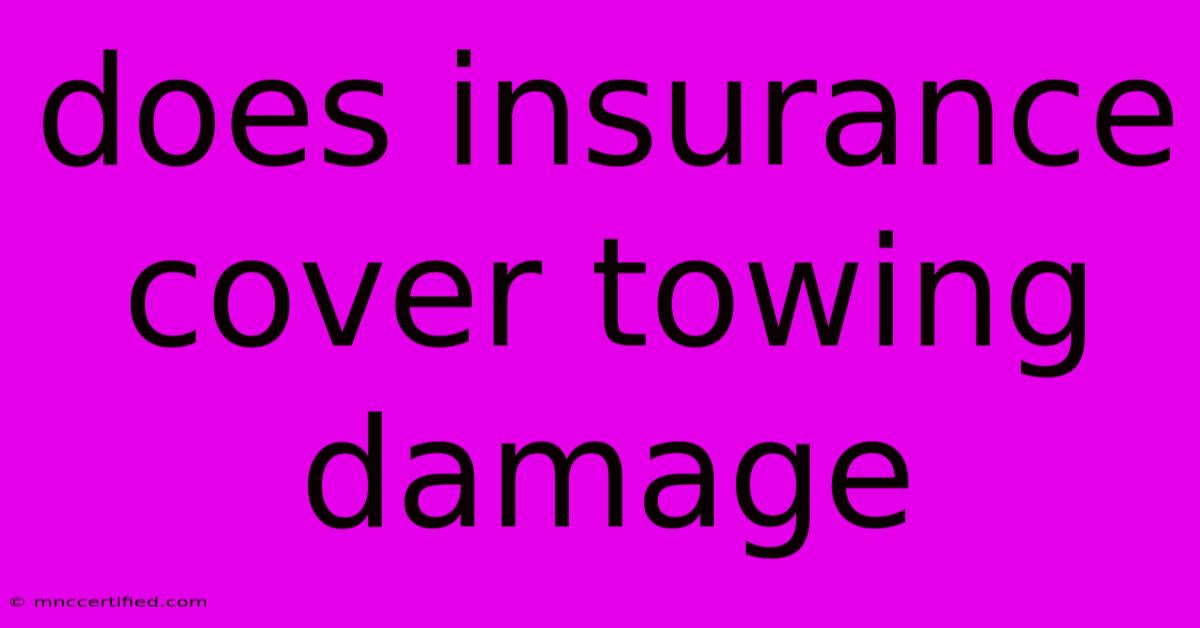Does Insurance Cover Towing Damage

Table of Contents
Does Insurance Cover Towing Damage? A Comprehensive Guide
Towing your vehicle can be a lifesaver in emergencies, but what happens if your car gets damaged during the tow? This is a common concern, and the answer to whether your insurance covers towing damage isn't a simple yes or no. It depends on several factors, including your specific policy, the circumstances of the damage, and the type of towing involved. Let's delve into the details to clarify this often confusing issue.
Understanding Your Insurance Policy
The first and most crucial step is reviewing your insurance policy. Different policies have different levels of coverage. Read the fine print carefully! Look for sections related to:
- Comprehensive Coverage: This typically covers damage to your vehicle caused by events outside of a collision, such as accidents, theft, vandalism, or even acts of nature. Some comprehensive policies may include damage incurred during towing, but it's not guaranteed.
- Collision Coverage: This covers damage to your vehicle resulting from a collision with another vehicle or object. Towing damage is generally not covered under collision coverage unless the damage occurred during a collision that requires towing.
- Roadside Assistance: Many policies offer roadside assistance, which may include towing. However, roadside assistance usually covers the cost of the tow itself, not damage to your vehicle during the towing process.
Key Takeaway: Don't assume your policy covers towing damage. Actively check your policy documents or contact your insurance provider directly to confirm your coverage.
Types of Towing Damage and Coverage
Towing damage can occur in various ways, and the likelihood of insurance coverage depends on the specific cause:
1. Damage from Improper Towing Techniques
Improper loading, securing, or handling of your vehicle during towing is a common cause of damage. This could include scratches, dents, broken lights, or even more severe structural damage. If the damage is a direct result of negligent towing practices by the towing company, your comprehensive coverage might cover the repairs. However, you'll likely need to prove negligence on the part of the towing company. This usually involves filing a claim with both your insurance and potentially pursuing a separate claim against the towing company.
2. Damage from Pre-existing Conditions
If your vehicle already had pre-existing damage, your claim may be denied or partially covered. The insurance company will investigate to determine the extent of the pre-existing damage versus damage caused by the towing process.
3. Damage During an Accident Involving the Tow Truck
If the tow truck is involved in a collision while towing your vehicle, and your vehicle sustains damage, your collision coverage should apply. This is because the damage resulted from a collision, regardless of the towing situation.
4. Damage Caused by Road Hazards During Towing
Damage caused by road hazards encountered while being towed (e.g., hitting a pothole) is a grey area. Comprehensive coverage might apply, depending on your policy and the specifics of the situation.
Filing a Claim for Towing Damage
If you believe your insurance should cover towing damage, follow these steps:
- Document the Damage: Take detailed photos and videos of the damage to your vehicle, noting the location and extent of the damage.
- Report the Incident to the Towing Company: Obtain a copy of the towing invoice and any relevant documentation from the towing company.
- Contact Your Insurance Company: Report the incident to your insurance provider immediately, providing all relevant documentation.
- Cooperate with the Investigation: Your insurance company will likely investigate the claim to determine the cause and extent of the damage.
Preventing Towing Damage
While you can't always prevent accidents, you can take steps to minimize the risk of damage during towing:
- Choose a Reputable Towing Company: Research and select a reputable towing company with positive reviews and a good safety record.
- Inspect Your Vehicle Before and After Towing: Before the tow, take photos of your vehicle's condition. After the tow, inspect it thoroughly for any new damage.
- Communicate Clearly with the Towing Operator: Explain any concerns about your vehicle's condition or special handling requirements.
In Conclusion: Whether your insurance covers towing damage is heavily dependent on your specific policy, the circumstances surrounding the damage, and the type of damage itself. Always review your policy, document everything, and communicate effectively with both the towing company and your insurance provider. Proactive steps to select a reputable towing company can also significantly reduce the risk of damage.

Thank you for visiting our website wich cover about Does Insurance Cover Towing Damage. We hope the information provided has been useful to you. Feel free to contact us if you have any questions or need further assistance. See you next time and dont miss to bookmark.
Featured Posts
-
Analyzing The Jazz Mavericks Rivalry
Nov 16, 2024
-
Uefa Nations Portugal Wins 2 0 Against Poland
Nov 16, 2024
-
Tyler Childers Forest Hills Concert
Nov 16, 2024
-
Stallone Latest Celebrity To Support Trump
Nov 16, 2024
-
Carnation Revolution Icon Passes
Nov 16, 2024